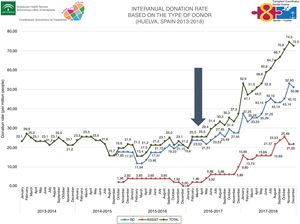The success of the Spanish model of donation and transplant is based on 3 basic pillars. A committed and generous society that, at its darkest hour, says yes to donation; a public and universal healthcare system that allows equal and transparent access to transplants for every citizen; lastly, a unique and structured organizational model where the tasks of all healthcare providers involved in donation and/or transplant protocols are well-defined with guarantees and quality.
Although our system has elements that are common to other international models, the differential element that conditions the Spanish success worldwide1 is the in-hospital transplant coordinator represented in the intensivist. This professional systematically identifies and offers the possibility of donation to the family respectfully and freely to safeguard the last wishes of the deceased.2 Once the family has said «yes» to donation the intensivist-coordinator, on top of supporting the family, makes sure that the donor is kept in optimal conditions so that his organs are eligible for transplant with the highest quality and guarantees possible.
A clear example of the importance of the intensivist as a transplant coordinator is what has happened over the last few years in the province of Huelva, Spain. Back in April 2017 (blue arrow in Fig. 1), The Juan Ramón Jiménez Hospital, reference center on neurocritical care in Huelva, integrated transplant coordination into the healthcare structure of the intensive care unit. Thanks to this integration expressed in the work done both by the coordinator and the specialist, in little over a year, the donation rate in the province of Huelva has gone up from 25.5–70.2 donors per million inhabitants.
The role of the transplant coordinator as the key element to improve the process of donation was already known3,4 but, as it the Spanish case shows, intensive medicine integration has been the key to put the province of Huelva first in the worldwide list of donation and transplants.
FundingThe authors declared that they received no funding while conducting this study.
Please cite this article as: Martin-Villen L, Cabeza-Cabezab F, Egea-Guerrero JJ. Intensivista o coordinador de trasplantes: tanto monta monta tanto. Med Intensiva. 2020;44:62–63.







